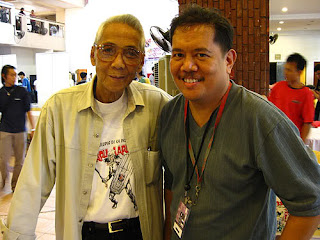They’ve worked relentlessly to advance their causes, overcoming barriers that have stopped lesser mortals.
Bicolana Fe Niosco Lastrella travelled to Capitol Hill to tell lawmakers about her anguish after losing her daughter, son, son-in-law and granddaughter from a runaway Toyota Lexus in San Diego in August 2009.
The House Committee on Oversight and Government Reform held hearings in February to investigate the mystery of run-away Toyota cars.

Toyota said Lastrella’s loved ones died from a freak accident. But she never relented, insisting Toyota is to blame and through her congressional testimony, provided a human face to the tragedy.
“We now know that the terrifying deaths of this family were not caused by a freak accident,” Rep. Edolphus Towns (10th district NY) declared.
Toyota Motor president Akio Toyoda apologized to her family.
Just before Christmas, Toyota agreed to pay $10 million to settle the law suit filed by the Lastrella’s and son-in-law Mark Saylor, a decorated California Highway Patrol officer.
Tani Cantil-Sakauye was one of the big winners in last month’s midterm elections and was sworn in as California’s first Fil-Am and Asian-American to win the post of Supreme Court Chief Justice.
Before being nominated by Governor Arnold Schwarzenegger, she was an Associate Justice of the California 3rd District Court of Appeal.
She was born and grew up is Sacramento, CA.

After graduating with a baccalaureate degree from the University of California at Davis, she took a year off to live in the Philippines, returning in 1981 to enter law school.
Her Filipina mother and Filipino-Portuguese father came to America to work in Hawaii’s sugar and pineapple plantations until they relocated to Sacramento.
She is married to police lieutanent Mark Sakauye and is active in Fil-Am and Asian-American activities. She was named Sacramento’s Filipina of the Year in 2003.
Closer to home, Kriselda “Kris” Valderrama won a 2nd term as one of three representatives in the 26th district of the Maryland House of Delegates.
The district encompasses one of the fastest growing areas of Prince George’s County, including the Fil-Am enclaves in Fort Washington and Oxon Hill, where she grew up.

“The Filipino-American vote is very significant in the district. We definitely have an effect on the outcome of elections,” she told us in a pre-election interview.
She is the daughter of former Maryland Delegate David Valderrama, who was the first Fil-Am to be elected in a mainland US state legislature about two decades ago.
With a BS Respiratory Therapy degree from Salisbury State University, Valderrama also works with the 1.4 million-strong American Federation of State, County and Municipal Employees (AFSCME) where she specialized in child care, home care and health care organizing.
In August, President Obama appointed Fil-Am Ma. Elizabeth “Maribeth” Raffinan as Associate Justice of the Superior Court of Washington DC.
“Throughout her career, Maribeth Raffinan has shown a commitment to justice and public service,” President Obama said in a statement.
She is the daughter of Drs. Jun and Maria Raffinan, a couple well-known in Tampa, Florida for their community and charity work.
Another Pinay who made a splash in 2010 was Jessica Cox, the armless inspiration who we met at the 20th anniversary celebration of the landmark American with Disabilities Act held in the White House last July.
Cox is a licensed sports pilot. President Obama thanked the 27-year-old Fil-Am for serving as an inspiration for about 54 million Americans who suffer from some form of disability.
She drives her own car. In school, she was a swimmer, gymnast, tap dancer and even earned a black belt in Tae Kwon Do.

She was born to Filipina mother Inez Cox and American father William Cox, a retired teacher.
She writes in her blog, “It is her unrepentant regard for herself a whole person, her high degree of self-acceptance that gives her the freedom and power to insist that society accept her too, just as she is.”
Cox travels around the world as an inspirational speaker, where her mere presence is enough to challenge audiences to greater heights.
Gloria Steele became the first Fil-Am to be appointed country director of the US Agency for International Development (USAID) in the Philippines.

Before her new assignment, she was Senior Deputy Administrator of the USAID’s Global Health Bureau.
She was born and grew up in the Philippines, earning her Business Administration degree at Maryknoll College in Quezon City, and worked in 1974-80 as a consultant at the Marcos-era Ministry of Agriculture.
When President Obama appointed Hector Vargas Jr. and Rozita Villanueva Lee as members of the President’s Advisory Commission on Asian Americans and Pacific Islanders, Lee told us that was an opportunity for the Fil-Am community to raise their most pressing concerns to the President’s attention.
Lee was born in Maui, Hawaii but traces her roots directly to San Manuel, Pangasinan.

She eventually settled in Las Vegas, Nevada with her late husband Dr. Clifford Lee, where she became a tireless advocate of Fil-Am issues, including the decades-old struggle for Filipino World War II veterans rights.
She is National Vice Chair of the National Federation of Filipino American Associations (NaFFAA) and has been named as among the 100 most influential Filipinas in the US by the Filipina Women’s Network..
A former broadcaster and producer, Lee has made it a virtual crusade for Fil-Ams to become more politically active and make their presence felt in America.










































